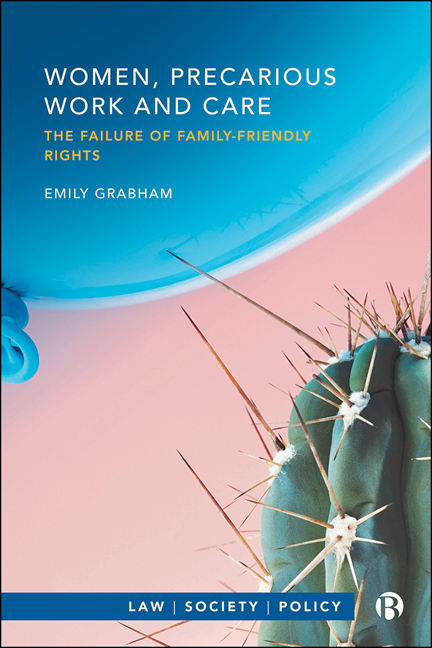Book contents
- Frontmatter
- Contents
- List of Figures
- Acknowledgements
- Series Editor’s Preface
- one Introduction
- two Starting and Surviving in Precarious Work
- three Providing Care: Daily Routines and Experiences
- four Care Networks
- five “Rocking the Boat”: Talking about Care in a Precarious Job six How Employers Responded
- six How Employers Responded
- seven What Women Did Next
- eight Care-Friendly Rights for Precarious Workers
- Appendix How the Research Was Conducted
- Index
seven - What Women Did Next
Published online by Cambridge University Press: 13 May 2022
- Frontmatter
- Contents
- List of Figures
- Acknowledgements
- Series Editor’s Preface
- one Introduction
- two Starting and Surviving in Precarious Work
- three Providing Care: Daily Routines and Experiences
- four Care Networks
- five “Rocking the Boat”: Talking about Care in a Precarious Job six How Employers Responded
- six How Employers Responded
- seven What Women Did Next
- eight Care-Friendly Rights for Precarious Workers
- Appendix How the Research Was Conducted
- Index
Summary
We have seen in Chapters Five and Six that women encountered a range of problems when disclosing care obligations at work. This chapter focuses on what the women did next. It explores how they found out about family-friendly rights, how they felt about their contracts and what actions they took. Despite all the differences in the women's jobs and their understanding of the law, every woman interviewed for this project talked about her contract and her boss. For this reason, a key theme in this chapter concerns women's bargaining power at work: the way that women's understanding of their contracts and relationships with their managers interacted with their wider circumstances and affected if, when and how they could negotiate at work. Bargaining power was in large part shaped by the type of contract women had, so understanding the ‘chill effect’ of particular precarious contracts is important to understanding women's experiences at work more broadly.
Using this understanding of women's bargaining power, the chapter then describes what interviewees did when employers responded negatively to their requests or when their overall working environment was hostile to balancing care with work. This is important because on the whole, interviewees wanted to remain in employment and so were faced with an immediate dilemma about how to reconcile competing demands. When they had more bargaining power at work, women asserted their rights, considered legal action or brought children into work. When women had less bargaining power, they absorbed the stress back into their home and care environment, took sick leave to cover care emergencies or they left their jobs.
Finding out about employment rights
We have already seen in Chapter One that many of the women interviewed for the study would not have been eligible to claim rights in order to request flexible work or take time off for family and dependents in an emergency, for example, because they were not ‘employees’ and/or they did not have sufficient time working with the employer. Indeed, the research project that led to this book started with the question of what women do when they are not eligible for family-friendly rights, as we know that such rights are only generally available to a narrow group of ‘employees’ and often do not cover precarious contracts.
- Type
- Chapter
- Information
- Women, Precarious Work and CareThe Failure of Family-friendly Rights, pp. 119 - 146Publisher: Bristol University PressPrint publication year: 2021



